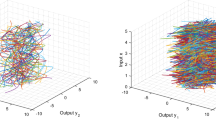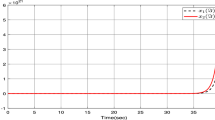Abstract
This paper addresses the identification of finite impulse response (FIR) systems with both quantized and event-triggered observations. An event-triggered communication scheme for the binary-valued output quantization is introduced to save communication resources. Combining the empirical-measure-based identification technique and the weighted least-squares optimization, an algorithm is proposed to estimate the unknown parameter by full use of the received data and the not-triggered condition. Under quantized inputs, it is shown that the estimate can strongly converge to the real values and the estimator is asymptotically efficient in terms of the Cram’er-Rao lower bound. Further, the limit of the average communication rate is derived and the tradeoff between this limit and the estimation performance is discussed. Moreover, the case of multi-threshold quantized observations is considered. Numerical examples are included to illustrate the obtained main results.
Similar content being viewed by others
References
Söderström T, Stoica P. System Identification. Upper Saddle River: Prentice Hall, 1989
Wang L Y, Zhao W X. System identification: new paradigms, challenges, and opportunities. Acta Autom Sin, 2013, 39: 933–942
Akyildiz I F, Su W, Sankarasubramaniam Y, et al. Wireless sensor networks: a survey. Comput Netw, 2002, 38: 393–422
Hespanha J P, Naghshtabrizi P, Xu Y. A survey of recent results in networked control systems. Proc IEEE, 2007, 95: 138–1
Guo J, Mu B, Wang L Y, et al. Decision-based system identification and adaptive resource allocation. IEEE Trans Automat Contr, 2017, 62: 2166–2179
Ma C Q, Li T, Zhang J F. Consensus control for leader-following multi-agent systems with measurement noises. J F. Consensus control for leader-following multi-agent systems with measurement noises. J Syst Sci Complex, 2010, 23: 35–49
Ma C Q, Zhang J F. On formability of linear continuous multi-agent systems. J Syst Sci Complex, 2012, 25: 13–29
Aström K J, Bernhardsson B M. Comparison of Riemann and Lebesgue sampling for first order stochastic systems. In: Proceedings of the 41st IEEE Conference on Decision and Control, Las Vegas, 2002
Wang A, Liao X, Dong T. Event-triggered gradient-based distributed optimisation for multi-agent systems with state consensus constraint. IET Control Theory Appl, 2018, 12: 1515–1519
Shi D, Chen T, Shi L. On set-valued Kalman filtering and its application to event-based state estimation. IEEE Trans Automat Contr, 2015, 60: 1275–1290
Hetel L, Fiter C, Omran H, et al. Recent developments on the stability of systems with aperiodic sampling: an overview. Automatica, 2017, 76: 309–335
Wang A, Liao X, Dong T. Event-driven optimal control for uncertain nonlinear systems with external disturbance via adaptive dynamic programming. Neurocomputing, 2018, 281: 188–195
Wang A, Dong T, Liao X. Event-triggered synchronization strategy for complex dynamical networks with the Markovian switching topologies. Neural Netw, 2016, 74: 52–57
Yu Y G, Zeng Z W, Li Z K, et al. Event-triggered encirclement control of multi-agent systems with bearing rigidity. Sci China Inf Sci, 2017, 60: 110203
Zheng C, Li L, Wang L Y, et al. How much information is needed in quantized nonlinear control? Sci China Inf Sci, 2018, 61: 092205
Wang L Y, Zhang J F, Yin G G. System identification using binary sensors. IEEE Trans Automat Contr, 2003, 48: 1892–1907
Wang T, Tan J W, Zhao Y L. Asymptotically efficient non-truncated identification for FIR systems with binary-valued outputs. Sci China Inf Sci, 2018, 61: 129208
Guo J, Wang L Y, Yin G, et al. Asymptotically efficient identification of FIR systems with quantized observations and general quantized inputs. Automatica, 2015, 57: 113–122
Zhao Y, Wang L Y, Yin G G, et al. Identification of Wiener systems with binary-valued output observations. Automatica, 2007, 43: 1752–1765
Guo J, Wang L Y, Yin G, et al. Identification of Wiener systems with quantized inputs and binary-valued output observations. Automatica, 2017, 78: 280–286
Casini M, Garulli A, Vicino A. Input design in worst-case system identification with quantized measurements. Automatica, 2012, 48: 2997–3007
Zhao Y, Bi W, Wang T. Iterative parameter estimate with batched binary-valued observations. Sci China Inf Sci, 2016, 59: 052201
Goudjil A, Pouliquen M, Pigeon E. Identification of systems using binary sensors via support vector machines. In: Proceedings of IEEE 54th Annual Conference on Decision and Control, Osaka, 2015
Chow Y S, Teicher H. Probability Theory: Independence, Interchangeability, Martingales. 2nd ed. New York: Springer- Verlag, 1997
Wang L Y, Yin G G. Asymptotically efficient parameter estimation using quantized output observations. Automatica, 2007, 43: 1178–1191
Acknowledgements
This work was supported by National Natural Science Foundation of China (Grant No. 61773054).
Author information
Authors and Affiliations
Corresponding author
Rights and permissions
About this article
Cite this article
Guo, J., Diao, JD. Prediction-based event-triggered identification of quantized input FIR systems with quantized output observations. Sci. China Inf. Sci. 63, 112201 (2020). https://doi.org/10.1007/s11432-018-9845-6
Received:
Revised:
Accepted:
Published:
DOI: https://doi.org/10.1007/s11432-018-9845-6




